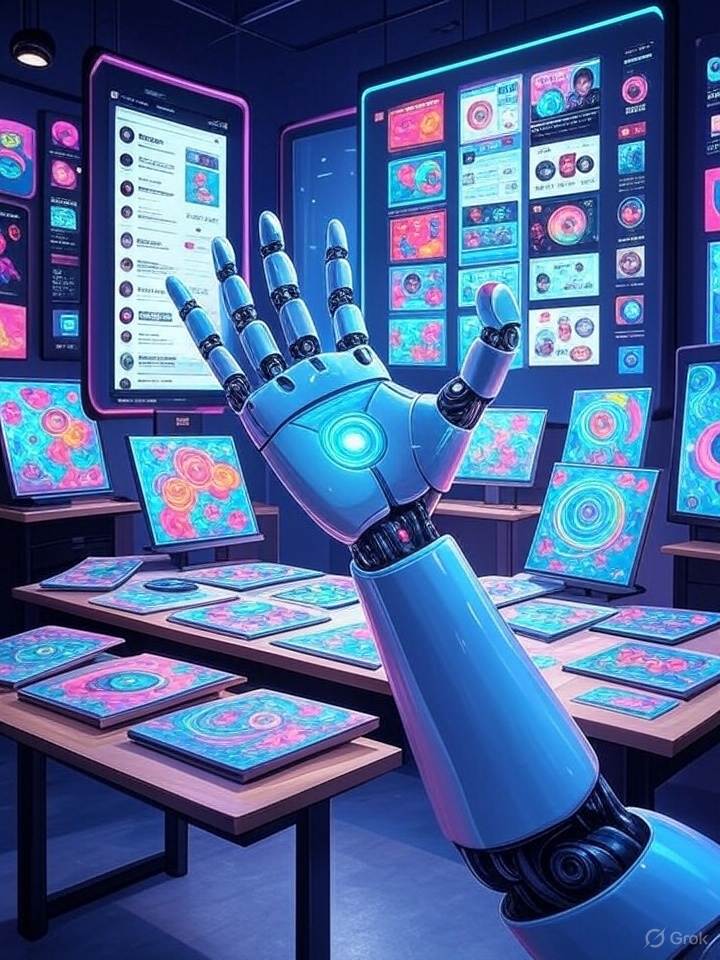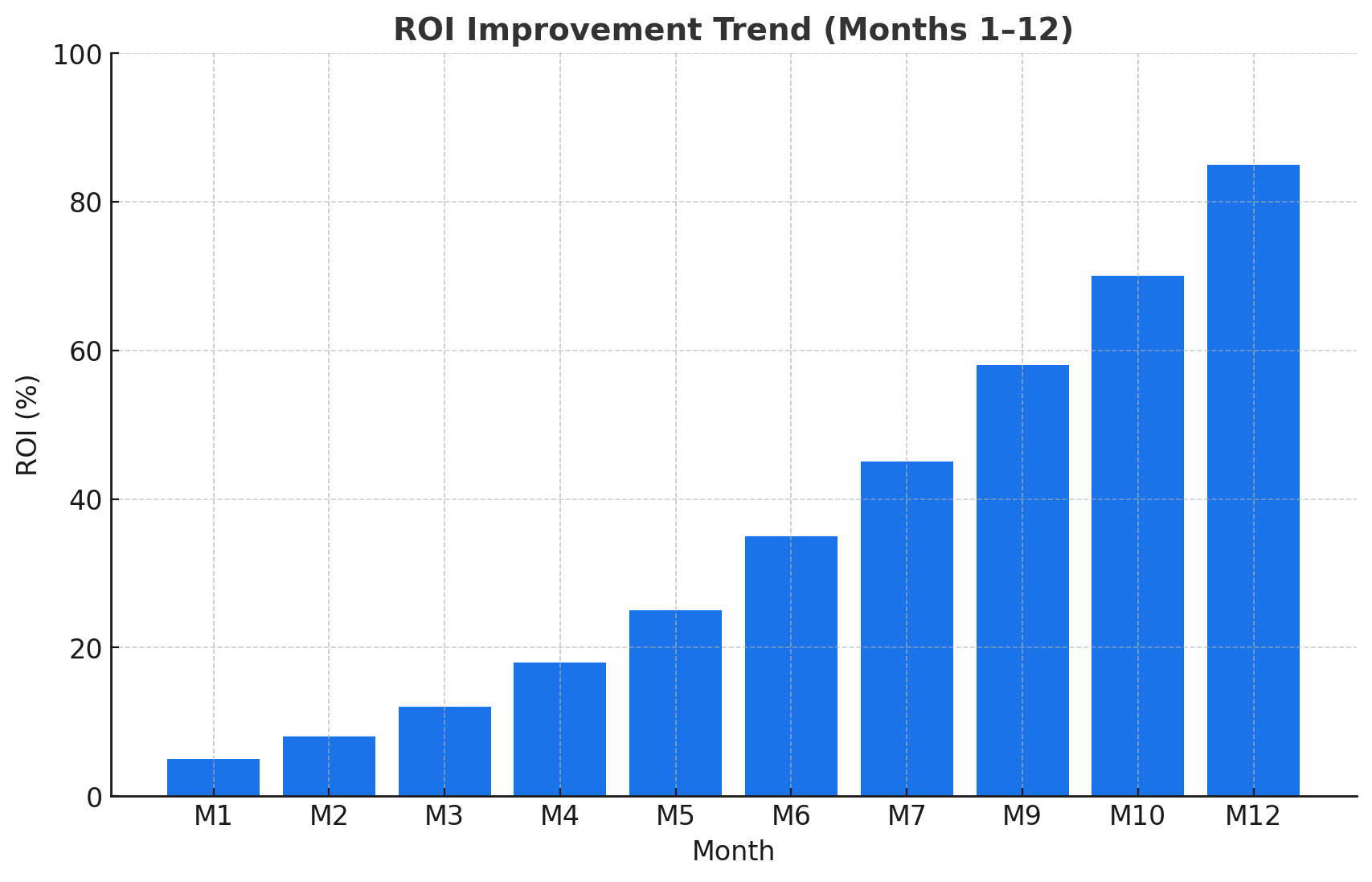AI Tools for Content Creation and Marketing: Transforming Digital Strategy
The digital marketing landscape has undergone a dramatic transformation with the emergence of artificial intelligence tools designed specifically for content creation and marketing. These innovative solutions are revolutionizing how businesses approach their digital strategies, offering unprecedented efficiency and creativity in content development.
Content Generation Capabilities

Figure: AI-assisted content generation (blogs, social posts, email).
Modern AI tools for content creation and marketing have become essential assets for companies seeking to maintain competitive advantages in today’s fast-paced digital environment. These sophisticated platforms can generate high-quality written content, create compelling visuals, optimize marketing campaigns, and analyze consumer behavior with remarkable precision.
AI-powered writing assistants have transformed the way marketers approach content creation. These tools can produce blog posts, social media content, email campaigns, and product descriptions in minutes rather than hours. You can input basic parameters about your target audience, desired tone, and key messaging, and receive polished content that aligns with your brand voice.
The sophistication of these AI tools for content creation and marketing extends beyond simple text generation. They can analyze trending topics, incorporate relevant keywords naturally, and adapt writing styles to match specific platforms or audiences. This capability enables marketing teams to scale their content production significantly while maintaining quality standards.
Visual Content Creation
Beyond written content, AI tools excel in creating stunning visual materials. These platforms can generate custom graphics, social media posts, infographics, and even video content based on your specifications. You simply describe what you need, and the AI produces professional-quality visuals that would traditionally require extensive design expertise.
Many businesses have discovered that AI-generated visuals perform exceptionally well across various marketing channels. The tools can create variations of designs, test different color schemes, and optimize images for specific platforms automatically.
Visual Content Creation

Figure: AI-generated visuals for multi-channel marketing.
Marketing Campaign Optimization
AI tools for content creation and marketing excel in campaign optimization through data-driven insights. These systems analyze vast amounts of consumer data to identify the most effective messaging, timing, and channel combinations for your campaigns.
- Automated A/B testing of different content variations
- Real-time campaign performance monitoring
- Predictive analytics for future campaign success
- Personalization at scale across multiple touchpoints
- Dynamic content optimization based on user behavior
Personalization and Customer Segmentation
One of the most powerful applications of AI in marketing involves creating personalized experiences for different customer segments. These tools analyze user behavior, preferences, and demographics to deliver tailored content that resonates with specific audiences.
You can leverage AI to create dynamic email campaigns that automatically adjust content based on recipient interests, generate personalized product recommendations, and develop targeted social media content for different demographic groups. This level of personalization significantly improves engagement rates and conversion metrics.
SEO and Content Strategy Enhancement
AI tools for content creation and marketing provide valuable assistance in search engine optimization strategies. These platforms can identify trending keywords, analyze competitor content, and suggest optimization opportunities that might otherwise go unnoticed.
The integration of AI in SEO workflows helps you understand search intent better, create content that addresses specific user queries, and optimize existing content for improved search visibility. These tools can also predict which topics are likely to gain traction in your industry.
Analytics and Performance Measurement
Advanced analytics capabilities built into AI marketing tools provide comprehensive insights into content performance across all channels. You can track engagement metrics, conversion rates, and return on investment with unprecedented detail and accuracy.
| Metric Type | AI Capability | Business Impact |
|---|---|---|
| Engagement Analysis | Real-time monitoring and pattern recognition | Improved content resonance |
| Conversion Tracking | Attribution modeling across touchpoints | Better ROI measurement |
| Predictive Insights | Forecasting future performance trends | Strategic planning optimization |
Implementation Strategies
Successfully integrating AI tools for content creation and marketing requires strategic planning and gradual implementation. Start by identifying your most time-consuming content creation tasks and evaluate which AI solutions can address those specific challenges effectively.
Consider your team’s technical expertise and choose tools that align with your current capabilities while offering room for growth. Many platforms provide extensive training resources and support to help you maximize their potential.
The future of digital marketing lies in the intelligent application of AI technologies that enhance human creativity rather than replace it. These tools empower marketers to focus on strategy and innovation while automating routine tasks that previously consumed significant time and resources.
Top Content Generation Platforms Revolutionizing Writing Workflows
Modern content creation demands speed, efficiency, and quality—three elements that traditional writing methods struggle to deliver consistently. AI tools for content creation and marketing have transformed how businesses, marketers, and content creators approach their daily workflows. These intelligent platforms analyze vast datasets, understand context, and generate human-like content that resonates with target audiences while maintaining brand voice and messaging consistency.
Writers today face unprecedented pressure to produce high-quality content across multiple platforms, formats, and channels. The rise of content marketing has created an insatiable demand for blog posts, social media updates, email campaigns, product descriptions, and video scripts. This constant need for fresh content often leads to burnout, reduced quality, and missed deadlines. AI-powered writing assistants have emerged as essential tools that complement human creativity rather than replace it.
Leading AI Writing Platforms Transforming Content Production
Jasper AI stands at the forefront of content generation technology, offering specialized templates for various marketing materials. You can create long-form blog posts, persuasive ad copy, and engaging social media content using its advanced language models. The platform learns your brand voice through custom training, ensuring consistent tone across all generated content. Its Boss Mode feature allows you to command the AI like a writing assistant, making complex content projects more manageable.
Copy.ai has revolutionized short-form content creation with its user-friendly interface and extensive template library. You’ll find specialized tools for email subject lines, product descriptions, and sales copy that convert. The platform’s strength lies in generating multiple variations of the same content, allowing you to test different approaches and optimize for better performance. Its workflow automation features help streamline repetitive writing tasks that consume valuable time.
Writesonic combines content generation with SEO optimization, making it particularly valuable for digital marketers. The platform creates content that ranks well in search engines while maintaining readability and engagement. You can generate entire article outlines, expand bullet points into full paragraphs, and optimize existing content for better search visibility. Its integration with Google Search Console provides data-driven insights for content improvement.
AI Tool Comparison Table
| Tool | Strengths | Price Range | Best For |
|---|---|---|---|
| Jasper AI | Long-form, brand voice, Boss Mode | $39–99/mo | Blogs, copywriting |
| Copy.ai | Short-form, fast variations | $0–49/mo | Social posts, email copy |
| Writesonic | SEO + Google Console insights | $19–79/mo | Blog + SEO optimization |
| Pictory | Video from text/blogs | $19–39/mo | YouTube & social videos |
| Buffer AI | Social media scheduling + AI | $6–12/mo | Small biz social strategy |
Specialized Tools for Different Content Formats
Video content creators benefit from platforms like Pictory and Lumen5, which transform written content into engaging video scripts. These AI tools for content creation and marketing analyze your text and suggest visual elements, transitions, and pacing that enhance viewer engagement. You can repurpose blog posts into video content, create social media videos from customer testimonials, or develop educational content that captures attention across platforms.
Social media managers rely on tools like Hootsuite’s AI composer and Buffer’s AI assistant to maintain consistent posting schedules. These platforms analyze your audience engagement patterns and suggest optimal posting times, hashtags, and content formats. The AI learns from your most successful posts and applies those insights to future content suggestions, improving engagement rates over time.
Integration and Workflow Optimization
The most effective AI writing platforms integrate seamlessly with existing content management systems, social media schedulers, and marketing automation tools. This connectivity eliminates the need for manual copying and pasting between platforms, reducing errors and saving time. You can create content in your AI tool, review and edit it, then automatically distribute it across multiple channels with proper formatting and scheduling.
Content calendars become more strategic when powered by AI insights. These tools analyze seasonal trends, competitor content, and audience behavior to suggest content topics and timing. You’ll receive recommendations for content gaps in your strategy and opportunities to capitalize on trending topics relevant to your industry.
Quality Control and Human Oversight
While AI tools for content creation and marketing have advanced significantly, successful implementation requires human oversight and editing. The best results come from using AI as a starting point for content creation, then applying human creativity, fact-checking, and brand expertise to refine the output. This collaborative approach combines the speed and consistency of AI with the nuance and strategic thinking that only humans provide.
These platforms continue evolving, incorporating feedback loops that improve accuracy and relevance. As they learn from user interactions and content performance, they become more effective at generating content that meets specific business objectives and audience preferences.
Marketing Campaign Optimization

Figure: Real-time AI optimization across channels.
Marketing Automation Through Artificial Intelligence Solutions
Modern businesses are transforming how they reach customers by using AI tools for content creation and marketing. These smart systems help companies work faster, create better content, and connect with their audience in ways that were impossible just a few years ago.
You can now automate repetitive marketing tasks while maintaining the personal touch your customers expect. AI tools for content creation and marketing handle everything from writing email campaigns to scheduling social media posts across multiple platforms. This technology learns from your data to make decisions that improve your marketing results over time.
How Smart Systems Change Your Marketing Game
When you use artificial intelligence in your marketing strategy, you’re getting a tireless assistant that works around the clock. These systems analyze customer behavior patterns, predict what content will perform best, and automatically adjust your campaigns for maximum impact. You no longer need to guess what your audience wants because AI shows you exactly what drives engagement.
The most powerful aspect of these solutions is their ability to personalize content at scale. While you focus on strategy and creative direction, AI handles the technical details of delivering the right message to the right person at the perfect time. Your customers receive content that feels custom-made for them, even when you’re reaching thousands of people simultaneously.
Content Creation That Never Sleeps
Creating fresh content consistently challenges even the most organized marketing teams. AI tools for content creation and marketing solve this problem by generating blog posts, social media updates, email newsletters, and product descriptions based on your brand guidelines and audience preferences.
These tools don’t just create random content. They study your existing materials, understand your voice and tone, then produce new pieces that match your style perfectly. You can generate multiple variations of the same message, test which version performs better, and let the system automatically use the winning content in future campaigns.
Smart Content Optimization Features
- Automatic keyword integration for better search engine visibility
- Real-time content performance monitoring and adjustments
- Multi-format content generation from a single input
- Brand voice consistency across all marketing channels
- Dynamic content personalization based on user data
Customer Journey Automation That Converts
Your customers follow complex paths before making purchase decisions. AI systems map these journeys and create automated touchpoints that guide prospects toward conversion. When someone visits your website, opens an email, or interacts with your social media, the system instantly knows what to do next.
This intelligent automation means you’re always present in your customer’s decision-making process without being pushy or overwhelming. The AI learns which messages work best at different stages of the buying process and delivers exactly what each person needs to move forward.
Data-Driven Decision Making Made Simple
Marketing automation through artificial intelligence gives you clear insights into what’s working and what isn’t. Instead of drowning in spreadsheets and reports, you get actionable recommendations that improve your campaigns immediately. The system tells you which subject lines get opened, which content drives clicks, and which channels deliver the best return on investment.
| Marketing Function | Traditional Method | AI-Enhanced Method |
|---|---|---|
| Email Campaigns | Manual scheduling and content creation | Automated personalization and optimal send times |
| Social Media | Daily manual posting | Content generation and scheduling across platforms |
| Lead Scoring | Basic demographic data | Behavioral analysis and predictive scoring |
| Content Planning | Monthly brainstorming sessions | Continuous AI-driven content suggestions |
Implementation Strategies That Work
Starting with AI tools for content creation and marketing doesn’t require a complete overhaul of your existing systems. You can begin by automating one area, like email marketing or social media posting, then gradually expand to other functions as you see results.
The key is choosing tools that integrate well with your current marketing stack. Look for solutions that connect seamlessly with your customer relationship management system, email platform, and analytics tools. This integration ensures your AI automation has access to all the data it needs to make smart decisions about your marketing campaigns.
Success with marketing automation comes from setting clear goals and letting the AI optimize toward those objectives. Whether you want more leads, higher engagement rates, or increased sales, these intelligent systems adapt their strategies to achieve your specific targets while you focus on growing your business.
Cost-Effective AI Implementation for Small Business Content Teams
Small businesses often struggle with creating enough quality content to compete in today’s digital marketplace. With limited budgets and lean teams, the traditional approach of hiring full-time writers or expensive agencies simply isn’t feasible. AI tools for content creation and marketing offer a game-changing solution, enabling small business content teams to produce professional-grade materials at a fraction of the cost.
The landscape of artificial intelligence has evolved dramatically, making sophisticated content creation tools accessible to businesses of any size. These AI-powered platforms can help you generate blog posts, social media content, email campaigns, product descriptions, and marketing copy in minutes rather than hours. The key lies in understanding which tools deliver the best value for your specific needs and budget constraints.
Essential AI Writing Tools That Won’t Break Your Budget
Several AI writing platforms offer excellent value propositions for small businesses. Tools like Jasper, Copy.ai, and Writesonic provide subscription plans starting at $20-30 per month, giving you access to dozens of content templates and unlimited generations. These platforms excel at creating first drafts that your team can then refine and personalize.
For even tighter budgets, consider tools like ChatGPT Plus or Claude, which cost around $20 monthly and can handle multiple content creation tasks beyond just writing. While they require more specific prompting skills, they offer incredible versatility for teams willing to invest time in learning proper prompt engineering.
Maximizing Your Content Output Without Additional Staff
The most significant advantage of AI tools for content creation and marketing is their ability to amplify your existing team’s productivity. A single content manager can now produce the output that previously required three or four writers. This multiplication effect comes from AI’s ability to handle the heavy lifting of initial content creation, leaving your team to focus on strategy, editing, and brand voice refinement.
Start by identifying your most time-consuming content tasks. If you spend hours writing product descriptions, use AI to generate multiple variations quickly. If social media posts drain your energy, leverage AI to create weeks of content in a single session. The goal is to automate the routine while preserving human creativity for high-impact decisions.
Smart Integration Strategies for Immediate Results
Successfully implementing AI tools requires a systematic approach rather than random experimentation. Begin with one content type where you need the most help. Master that application before expanding to other areas. This focused approach prevents overwhelm and allows you to measure real impact on your content production.
Create templates and workflows that incorporate AI generation as the first step, followed by human review and brand alignment. Establish quality standards that every piece of AI-generated content must meet before publication. This ensures consistency while maintaining your brand’s unique voice and values.
Training Your Team for AI-Powered Content Creation
Your team’s success with AI tools depends heavily on their understanding of how to communicate effectively with these systems. Invest time in training your content creators on prompt engineering – the art of crafting instructions that produce the best results from AI platforms.
Develop a library of proven prompts for different content types your business needs. Share successful prompts among team members and continuously refine them based on results. This collaborative approach builds institutional knowledge and improves output quality over time.
Measuring ROI and Content Performance
Track specific metrics to prove the value of your AI investment. Monitor content production volume, time saved per piece, engagement rates, and overall content costs. Many businesses see 3-5x increases in content output while reducing per-piece costs by 60-70%.
Document case studies of your most successful AI-assisted campaigns. These examples become powerful tools for justifying expanded AI tool budgets and demonstrating the strategic value of your content team’s evolving capabilities.
The future belongs to content teams that can blend human creativity with AI efficiency. By starting small, choosing the right tools, and building systematic processes, your small business can compete with much larger organizations in content quality and quantity. The investment in AI tools for content creation and marketing isn’t just about cost savings – it’s about unlocking your team’s potential to create more impactful content than ever before.
Quality Control and Human Oversight in Automated Content Production
The rise of AI tools for content creation and marketing has revolutionized how businesses produce written materials, but this technological advancement brings significant challenges in maintaining quality and accuracy. As automated systems generate increasing volumes of content at unprecedented speeds, the need for robust quality control mechanisms and human oversight becomes more critical than ever.
Automated content production systems excel at creating large quantities of text quickly, but they often struggle with nuance, context sensitivity, and brand voice consistency. These AI tools for content creation and marketing can produce factual errors, cultural insensitivities, or content that misses the mark entirely when it comes to audience expectations. Without proper oversight, businesses risk publishing material that damages their reputation or fails to serve their marketing objectives effectively.
Essential Quality Control Framework for AI-Generated Content
Establishing a comprehensive quality control framework requires multiple checkpoints throughout the content creation process. The first layer involves pre-production guidelines that define content parameters, brand voice requirements, and topic boundaries for AI systems. These guidelines serve as guardrails that help prevent AI tools from generating inappropriate or off-brand content from the start.
The second layer focuses on real-time monitoring during content generation. Advanced AI tools for content creation and marketing now include built-in quality assessment features that flag potential issues as content develops. These systems can identify grammar errors, factual inconsistencies, and deviation from established style guides before content reaches human reviewers.
Post-production review represents the final and most crucial layer of quality control. Human editors must evaluate AI-generated content for accuracy, relevance, and alignment with marketing goals. This review process should include fact-checking against reliable sources, ensuring compliance with industry regulations, and verifying that the content serves the intended audience effectively.
Human Expertise in the Automated Content Landscape
Human oversight brings irreplaceable value to automated content production through creative judgment, cultural awareness, and strategic thinking. While AI tools for content creation and marketing can process vast amounts of data and identify patterns, humans excel at understanding emotional subtleties, cultural context, and the complex relationships between brand messaging and audience perception.
Content strategists play a vital role in guiding AI systems toward producing materials that align with broader marketing campaigns and business objectives. They provide the strategic direction that ensures AI-generated content supports specific goals rather than simply filling space with generic text.
Subject matter experts contribute specialized knowledge that AI systems may lack, particularly in technical fields, regulated industries, or emerging markets. Their expertise helps identify factual errors, outdated information, or misleading statements that could harm a company’s credibility.
Implementing Effective Review Processes
Successful review processes for AI-generated content require clear workflows and defined responsibilities. Organizations should establish specific roles for different types of review, including technical accuracy checks, brand compliance verification, and audience appropriateness assessment.
The review process should include these key components:
- Initial automated screening for basic grammar, spelling, and formatting issues
- Fact-checking against authoritative sources and internal databases
- Brand voice and tone consistency evaluation
- Legal and compliance review for regulated content
- Final editorial review for overall quality and effectiveness
Technology can support human reviewers through collaborative platforms that track changes, maintain version control, and facilitate communication between team members. These tools help ensure that feedback gets incorporated effectively and that no critical issues slip through the review process.
Balancing Efficiency with Quality Standards
Organizations must strike the right balance between the speed advantages of AI tools for content creation and marketing and the quality assurance that human oversight provides. This balance requires careful consideration of content types, audience expectations, and business risk tolerance.
High-stakes content such as legal documents, medical information, or financial advice requires more intensive human oversight than general blog posts or social media updates. Organizations should develop tiered review processes that allocate human resources based on content importance and potential impact.
Training programs help team members understand both the capabilities and limitations of AI content generation tools. When humans understand how these systems work, they can provide more effective oversight and make better decisions about when to rely on automated output versus when to intervene with manual corrections or complete rewrites.
The future of automated content production depends on finding the optimal integration between artificial intelligence efficiency and human judgment. Companies that master this integration will produce higher-quality content more efficiently while maintaining the authenticity and strategic focus that audiences expect from professional marketing materials.
Performance Analytics and ROI Measurement for AI-Powered Campaigns
Understanding how your AI-powered marketing campaigns perform is crucial for making smart business decisions. You need to track specific metrics that show whether your AI tools for content creation and marketing are actually driving results. Without proper measurement, you’re essentially flying blind with your marketing budget.
The landscape of performance analytics has evolved significantly with the integration of artificial intelligence. Traditional metrics like click-through rates and impressions still matter, but AI campaigns require deeper analysis. You must examine how machine learning algorithms optimize your content in real-time and how this impacts your overall marketing effectiveness.
ROI Growth with AI Over Time

Figure: ROI Improvement Trend (Months 1–12). Hypothetical data for illustration.
Essential Metrics for AI Campaign Success
Your AI-powered campaigns generate massive amounts of data that can overwhelm even experienced marketers. Focus on metrics that directly correlate with business outcomes. Revenue attribution becomes more complex when AI tools for content creation and marketing automatically adjust messaging, timing, and targeting throughout the campaign lifecycle.
Customer acquisition cost (CAC) takes on new meaning with AI campaigns. You can track how AI optimization reduces acquisition costs over time as the system learns from user behavior. Lifetime value (LTV) calculations become more accurate because AI tools can predict customer behavior patterns with greater precision.
Engagement quality metrics reveal how well your AI-generated content resonates with audiences. Look beyond basic engagement rates to examine dwell time, scroll depth, and interaction patterns. These deeper metrics show whether AI tools are creating content that truly connects with your target audience.
Advanced Attribution Models for AI Campaigns
Traditional last-click attribution doesn’t work well for AI-powered marketing campaigns. Your AI tools for content creation and marketing touch customers at multiple points throughout their journey, making it difficult to assign credit accurately. Multi-touch attribution models provide a clearer picture of how AI contributes to conversions.
Data-driven attribution uses machine learning to analyze the actual contribution of each touchpoint. This approach works particularly well for AI campaigns because it can account for the complex interactions between different AI-optimized elements. You get a more accurate view of which AI tools drive the most value.
Time-decay models work well when your AI tools for content creation and marketing focus on nurturing leads over extended periods. Recent interactions receive more credit, which aligns with how AI typically optimizes for recency and relevance in content delivery.
ROI Calculation Frameworks
Calculating return on investment for AI-powered campaigns requires accounting for both direct and indirect costs. Direct costs include software licensing, data storage, and processing power. Indirect costs encompass training time, integration efforts, and ongoing optimization work.
Your AI tools for content creation and marketing often deliver benefits that extend beyond immediate campaign results. Account for efficiency gains, such as reduced content creation time and improved targeting accuracy. These operational improvements contribute significantly to overall ROI but are often overlooked in traditional calculations.
Consider the compound effect of AI learning over time. Initial ROI might appear modest, but AI systems typically improve performance as they process more data. Factor this improvement trajectory into your long-term ROI projections to get a realistic picture of AI campaign value.
Real-Time Performance Monitoring
AI campaigns require continuous monitoring because they adapt constantly to changing conditions. Set up dashboards that track key performance indicators in real-time. This allows you to identify issues quickly and capitalize on optimization opportunities as they emerge.
Automated alerts help you stay on top of significant performance changes. Configure notifications for metrics that fall outside expected ranges or when AI tools for content creation and marketing identify new opportunities. This proactive approach prevents small issues from becoming major problems.
Regular performance reviews should examine both quantitative metrics and qualitative factors. While numbers tell part of the story, understanding why AI made certain optimization decisions helps you refine your overall strategy. This knowledge becomes invaluable for future campaign planning and AI tool selection.
Building a comprehensive measurement framework for AI-powered campaigns takes time and expertise. Start with fundamental metrics and gradually add more sophisticated analysis as your team becomes comfortable with the data. The investment in proper analytics pays dividends through improved campaign performance and more efficient use of marketing resources.
Future Trends and Emerging Technologies in Intelligent Marketing Systems
The landscape of AI tools for content creation and marketing continues to evolve at breakneck speed, with emerging technologies reshaping how businesses connect with their audiences. These intelligent systems are becoming more sophisticated, offering unprecedented capabilities that transform traditional marketing approaches into dynamic, personalized experiences.
Machine Learning Evolution in Content Generation
Advanced machine learning algorithms are revolutionizing how AI tools for content creation and marketing operate. Next-generation systems now understand context, tone, and brand voice with remarkable accuracy. You can expect these tools to generate content that seamlessly matches your brand’s personality while adapting to different audience segments.
Neural networks are becoming more adept at processing vast amounts of data to identify trending topics, predict content performance, and suggest optimal posting times. These AI tools for content creation and marketing analyze user behavior patterns across multiple platforms, enabling marketers to create highly targeted campaigns that resonate with specific demographics.
Predictive Analytics and Consumer Behavior Forecasting
The integration of predictive analytics into AI tools for content creation and marketing represents a significant leap forward. These systems can now forecast consumer preferences weeks or even months in advance, allowing you to prepare content strategies that align with future trends.
Real-time sentiment analysis capabilities enable these platforms to adjust messaging instantly based on audience reactions. When you launch a campaign, AI monitors social media responses, engagement metrics, and conversion rates to automatically optimize content performance across all channels.
Key Predictive Features
- Customer lifetime value predictions
- Churn probability assessments
- Purchase intent scoring
- Content virality forecasting
- Seasonal trend identification
Multimodal Content Creation Capabilities
Emerging AI tools for content creation and marketing are expanding beyond text generation to encompass multiple media formats simultaneously. These platforms can create cohesive campaigns that include written content, images, videos, and audio elements that maintain consistent messaging across all formats.
Voice synthesis technology integrated into these systems allows you to generate podcast content, voiceovers, and audio advertisements in multiple languages and accents. The AI maintains brand consistency while adapting delivery styles to suit different platforms and audience preferences.
Autonomous Campaign Management Systems
Future AI tools for content creation and marketing are developing autonomous capabilities that minimize human intervention while maximizing campaign effectiveness. These systems can independently create, test, and optimize entire marketing campaigns based on predefined goals and parameters you establish.
Self-learning algorithms continuously improve campaign performance by analyzing success patterns and failure points. When you set campaign objectives, the AI develops multiple content variations, deploys them across appropriate channels, and automatically scales successful elements while discontinuing underperforming content.
Future Technology Enhancements in AI Marketing
| Technology | Current Capability | Emerging Enhancement | Expected Impact |
|---|---|---|---|
| Natural Language Processing | Basic text generation | Contextual understanding | Higher content relevance |
| Computer Vision | Image recognition | Dynamic visual creation | Personalized imagery |
| Behavioral Analytics | Historical data analysis | Real-time adaptation | Instant optimization |
| Predictive Analytics | Trend forecasting | AI-driven consumer behavior prediction | Proactive content & campaign planning |
| Voice AI | Speech recognition | Natural voice synthesis & multilingual delivery | Immersive voice-driven marketing experiences |
Integration with Emerging Platforms
AI tools for content creation and marketing are rapidly adapting to new social platforms and communication channels as they emerge. These systems automatically learn the unique content requirements, audience behaviors, and engagement patterns of each platform to optimize content accordingly.
Virtual and augmented reality integration represents the next frontier for these tools. You can create immersive marketing experiences where AI generates 3D content, interactive environments, and personalized virtual showrooms that respond to individual user preferences and behaviors.
Privacy-Preserving Intelligence
As data privacy regulations become more stringent, AI tools for content creation and marketing are developing federated learning capabilities. These systems can improve their performance without accessing sensitive user data directly, ensuring compliance while maintaining effectiveness.
Blockchain integration is emerging as a solution for transparent, secure data handling within these platforms. You can track how your content performs while ensuring user privacy remains protected throughout the entire marketing process.
The convergence of these technologies promises marketing systems that understand, predict, and respond to consumer needs with unprecedented precision, making AI tools for content creation and marketing indispensable for competitive advantage in the digital marketplace.
Content Production Efficiency: Human vs. AI-Assisted
| Content Type | Human Only | With AI |
|---|---|---|
| Blog Post |
≈ 4.0 hrs
|
≈ 1.0 hr
|
| Social Media Post |
≈ 1.0 hr
|
≈ 0.2 hr
|
| Email Campaign |
≈ 3.0 hrs
|
≈ 0.7 hr
|
| Product Description |
≈ 2.0 hrs
|
≈ 0.3 hr
|
Conclusion
The digital marketing landscape has fundamentally shifted with the integration of AI tools for content creation and marketing. These intelligent solutions are no longer experimental additions to your marketing toolkit—they’re essential components that drive efficiency, creativity, and measurable results.
You now have access to powerful content generation platforms that can transform your writing workflows, eliminating the bottleneck of manual content creation while maintaining quality standards. Marketing automation through artificial intelligence has evolved beyond simple email sequences, offering sophisticated campaign management that adapts to audience behavior in real-time.
Small businesses particularly benefit from cost-effective AI implementation strategies that level the playing field with larger competitors. You don’t need massive budgets to harness these technologies—smart integration and strategic tool selection deliver impressive returns on investment.
The key to success lies in balancing automation with human oversight. Quality control remains crucial as you scale your content production. Your team’s creative input combined with AI efficiency creates a powerful synergy that neither humans nor machines could achieve alone.
Performance analytics and ROI measurement capabilities built into modern AI marketing platforms provide unprecedented insights into campaign effectiveness. You can now track, analyze, and optimize your content strategy with data-driven precision.
Looking ahead, emerging technologies promise even more sophisticated intelligent marketing systems. Voice AI, predictive analytics, and advanced personalization tools will continue reshaping how you connect with audiences.
AI tools for content creation and marketing represent more than technological advancement—they’re your gateway to sustainable, scalable growth. Embrace these solutions thoughtfully, and you’ll build marketing systems that work smarter, not harder.
Frequently Asked Questions
What are the best AI tools for content creation in 2025?
It depends on the job: Jasper and Writesonic for long-form + SEO; Copy.ai for short-form variations; Pictory and Lumen5 for text-to-video; Buffer AI and Hootsuite AI for social ideation + scheduling. Pick based on integrations, budget, and team workflow.
How do AI tools improve content marketing?
They speed up drafting/editing, surface SEO opportunities, personalize at scale, automate A/B tests, and deliver real-time analytics—leading to more output, higher engagement, and better ROI.
Are AI writing tools replacing human writers?
No—results are best with a human–AI partnership: AI handles first drafts, outlines, and variants; humans add strategy, brand voice, creativity, fact-checking, and compliance.
Which AI tools are best for small businesses?
Start lean: ChatGPT Plus or Claude for general writing; Copy.ai/Writesonic for templates; Canva’s AI and Pictory for visuals/video; Buffer AI for social scheduling. Begin with one use case, measure, then expand.
Related External Resources
| Tool / Resource | Anchor Text | URL |
|---|---|---|
| Jasper AI | Jasper AI content platform | https://www.jasper.ai |
| Copy.ai | Copy.ai writing assistant | https://www.copy.ai |
| Writesonic | Writesonic SEO writing tool | https://writesonic.com |
| Pictory | Pictory video creation tool | https://pictory.ai |
| Lumen5 | Lumen5 video automation | https://lumen5.com |
| Buffer | Buffer AI for social media | https://buffer.com |
| Hootsuite | Hootsuite AI Composer | https://hootsuite.com |
| HubSpot Blog | AI marketing insights | https://blog.hubspot.com |
| Neil Patel | AI content marketing strategies | https://neilpatel.com/blog/ |
Related Internal Resources
| Page / Resource | Anchor Text | URL |
|---|---|---|
| AI Key for Riches Blog | AI tools for digital growth | https://ai.keyforriches.com |
| AI Side Hustle Guide | Make money online with AI side hustles | https://ai.keyforriches.com/ai-side-hustle |
| AI Social Media Automation Tools 2025 | Social media automation with AI | https://ai.keyforriches.com/ai-social-media-automation-tools-2025 |
| AI Journey Automation Platform | Customer journey automation | https://ai.keyforriches.com/ai-customer-journey-automation-platform |
| Blog Reviews | Affiliate reviews and insights | https://blog.keyforriches.com |
| SEO Tools Suite | Free SEO tools (rank checker, backlinks, etc.) | https://tools.keyforriches.com |

